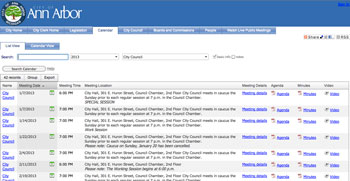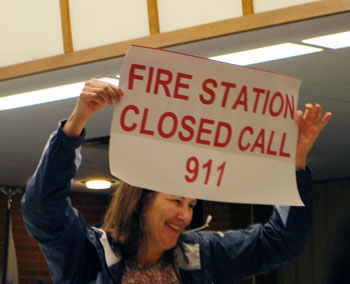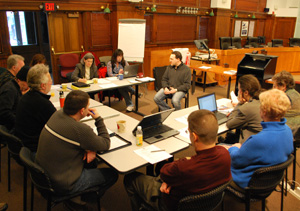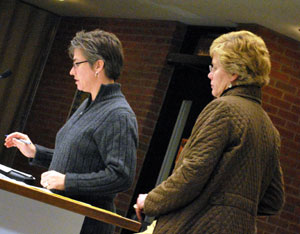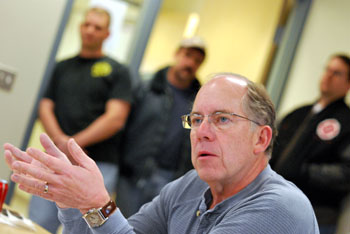Editor’s note: This “Live Updates” coverage of the Ann Arbor city council’s May 19, 2014 meeting includes all the material from an earlier preview article published last week. The intent is to facilitate easier navigation from the live updates section to background material already in this file.
Results on the outcome on many individual agenda items can be found published as separate briefs in the Civic News Ticker section of the website. A summary of the FY 2015 budget deliberations will be available here, when its is published: [link]
The council’s second meeting in May is specified in the city charter as the occasion for the council to adopt the city administrator’s proposed budget with any amendments. If the council does not take action by its second meeting in May, the city administrator’s proposed budget is adopted by default. The Chronicle has previously reported a preview of some possible budget amendments: [here].
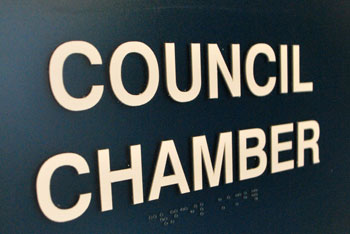
The sign on the door to the Ann Arbor city council chamber includes Braille.
The council’s May 19 meeting agenda includes more than just the adoption of the budget.
Related to the setting of the annual budget are items like setting fees associated with the public services area (for example, site plan review) and the community services area (for example, farmers market stall fees), as well as rate increases for water, sewer and stormwater utilities.
Also related to the budget – and not just for this next year – is an agenda item that will revise the city’s policies for contributions to the city’s pension system and retiree health care. In broad strokes, those revisions are meant to accelerate contributions during a strong economy and maintain contributions at least at the level of the actuary-recommended amount during weaker economies.
Another budget-related item on the May 19 agenda is one related to the social infrastructure of the community – allocation of general fund money to nonprofits that provide human services. The city approaches this allocation through a process that is coordinated with Washtenaw County, the United Way, the Ann Arbor Area Community Foundation and other partners. The total amount allocated for the operation of programs is about $4.3 million. The city of Ann Arbor’s general fund contribution is about $1.2 million, which is the same amount that has been contributed for the last several years.
Related to human services support is an agenda item that would accept a $113,154 planning grant from the Michigan Supreme Court to establish a specialized mental health court.
Along with social infrastructure, the council will also be asked to approve an allocation that includes utilities infrastructure, to address the needs that resulted from the harsh winter. The resolution that the council will consider would allocate money from the fund balance reserves from three sources: $1.7 million from the major street fund, $638,000 from the local street fund, and $666,000 from the water fund. Those amounts include $461,171 from the state of Michigan.
The council will also be asked to approve money for building new physical infrastructure – about $2.6 million for the reconstruction of a segment of Pontiac Trail. The segment stretches north of Skydale Drive to just south of the bridge over M-14/US-23. The street reconstruction project also includes water mains, sanitary sewer, and construction of new sidewalk along the east side of Pontiac Trail, and installation of bike lanes.
Special assessments to pay for three other sidewalk projects also appear on the council’s agenda in various stages of the special assessment process. Those future projects are located on Barton Drive, Scio Church Road, and Newport Road.
The council will be asked to approve the city’s application for federal funding to support the acquisition of development rights in Superior Township for two pieces of property on either side of Vreeland Road. The properties are near other parcels already protected as part of the city’s greenbelt initiative.
The city council will also vote on the confirmation of two appointments: Katherine Hollins to the city’s environmental commission; and Bob White, as a reappointment to his fourth term on the city’s historic district commission.
This article includes a more detailed preview of many of these agenda items. More details on other agenda items are available on the city’s online Legistar system. The meeting proceedings can be followed Monday evening live on Channel 16, streamed online by Community Television Network starting at 7 p.m.
The Chronicle will be filing live updates from city council chambers during the meeting, published in this article below the preview material. Click here to skip the preview section and go directly to the live updates. The meeting is scheduled to start at 7 p.m. [Full Story]






